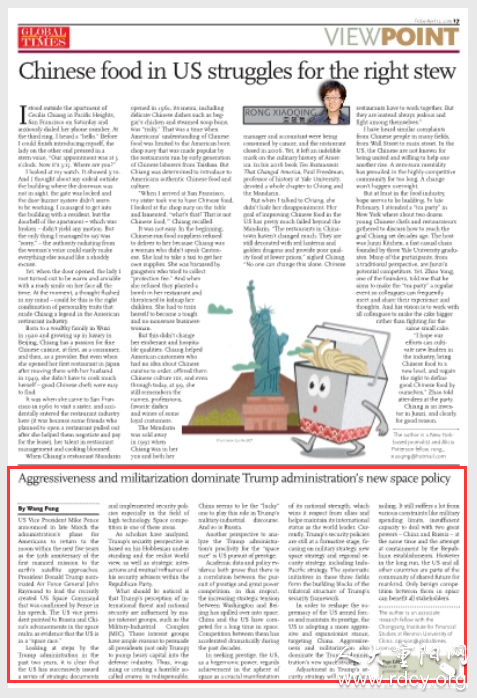Major Power Relations
Your Present Location: PROGRAMS> Major Power RelationsWang Peng: Aggressiveness and militarization dominate Trump administration’s new space policy
By Wang Peng Source: Global Times Published: 2019-4-11

US Vice President Mike Pence announced in late March the administration's plans for Americans to return to the moon within the next five years as the 50th anniversary of the first manned mission to the earth's satellite approaches. President Donald Trump nominated Air Force General John Raymond to lead the recently created US Space Command that was confirmed by Pence in his speech. The US vice president pointed to Russia and China's advancements in the space realm as evidence that the US is in a "space race."
Looking at steps by the Trump administration in the past two years, it is clear that the US has successively issued a series of strategic documents and implemented security policies especially in the field of high technology. Space competition is one of these areas.
As scholars have analyzed, Trump's security perspective is based on his Hobbesian understanding and the realist world view, as well as strategic interactions and mutual influence of his security advisers within the Republican Party.
What should be noticed is that Trump's perception of international threat and national security are influenced by major interest groups, such as the Military-Industrial Complex (MIC). These interest groups have ample reasons to persuade all presidents (not only Trump) to pump heavy capital into the defense industry. Thus, imagining or creating a horrible so-called enemy is indispensable. China seems to be the "lucky" one to play this role in Trump's military-industrial discourse. And so is Russia.
Another perspective to analyze the Trump administration's proclivity for the "space race" is US pursuit of prestige.
Academic data and policy evidence both prove that there is a correlation between the pursuit of prestige and great power competition. In this respect, the increasing strategic tension between Washington and Beijing has spilled over into space. China and the US have competed for a long time in space. Competition between them has accelerated dramatically during the past decades.
In seeking prestige, the US, as a hegemonic power, regards achievement in the sphere of space as a crucial manifestation of its national strength, which wins it respect from allies and helps maintain its international status as the world leader. Currently, Trump's security policies are still at a formative stage, focusing on military strategy, new space strategy and regional security strategy, including Indo-Pacific strategy. The systematic initiatives in these three fields form the building blocks of the trilateral structure of Trump's security framework.
In order to reshape the supremacy of the US armed forces and maintain its prestige, the US is adopting a more aggressive and expansionist stance, targeting China. Aggressiveness and militarization also dominate the Trump administration's new space strategy.
Adjustment in Trump's security strategy will not be plain sailing. It still suffers a lot from various constraints like military spending limits, insufficient capacity to deal with two great powers - China and Russia - at the same time and the attempt at containment by the Republican establishments. However in the long run, the US and all other countries are parts of the community of shared future for mankind. Only benign competition between them in space can benefit all stakeholders.
The author is an associate research fellow with the Chongyang Institute for Financial Studies at Renmin University of China.























































































 京公网安备 11010802037854号
京公网安备 11010802037854号





